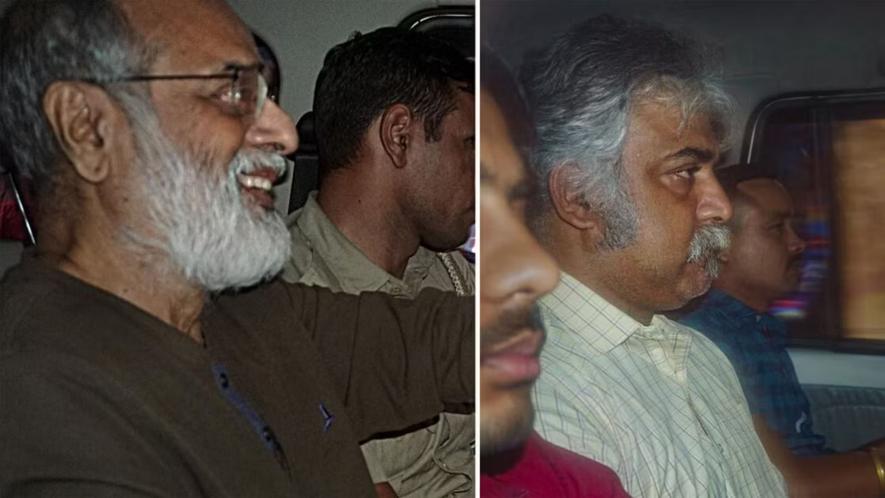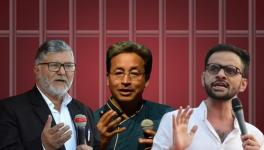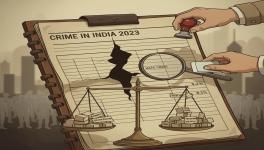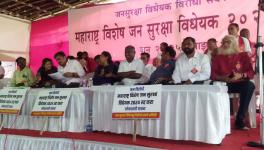REPLUG: Punitive Action Against Newsclick Echoes Muzzling of Press in Punjab in 1919

NewsClick founder Prabir Purkayastha (L) and HR Head Amit Chakravarty. Image Courtesy: PTI
The massive scale of police raids on the web portal, Newsclick, and those connected with it as contributors, employees and even ex-employees, has shocked the world. The sheer scale of such raids at the houses of close to 80 people, including about 50 journalists, across the country possibly constitutes the largest ever coercive action taken against any single media outlet in independent India.
The slapping of the draconian UAPA (Unlawful Activities (Prevention) Act) against Prabir Purkayastha, the founder editor of Newsclick, and Amit Chakraborty, the Human Resources head and their arrest and police remand for conducting investigation against them for an alleged “terror case with Chinese links”, amounts to equating independent journalism with terrorism.
The highly unacceptable case of sealing the office of the web portal for two days led to complete shutdown of its activities to transmit news and views, so essential for functioning of our democracy and holding the government to account.
Even earlier in 2021, the Enforcement Directorate (ED) had raided several of those associated with Newsclick, including Purkayastha for a week. No charge sheet has been filed on the matter and the Delhi High Court protected him and others from any coercive action.
Read Also: Statement by Newsclick on Oct 3 Raids by Special Cell of Delhi Police
Muzzling of Press in Punjab in 1919 Under Martial Law
All the intimidating and alarming measures, especially invoking terror charges under UAPA, chillingly remind one not of the days of the Emergency during 1975-1977 but of the British era Martial Law imposed on Punjab in 1919 when the Jallianwala Bagh massacre took place. During those frightening days, the magnitude of the muzzling of the press was such that the intensity of its scale would be comparable with the menacing measures taken against Newsclick.
Gandhi's Report
Consider the following excerpts from the “CONGRESS REPORT ON THE PUNJAB DISORDERS”, authored by Mahatma Gandhi in 1920 after the terrible Jallianwala Bagh massacre of 1919.
While flagging the point that there was suppression of public opinion by gagging the local press and shutting out nationalist newspapers from outside the Punjab, the report observed:
“Even a scholarly lawyer of Mr. Manohar Lal’s standing… was arrested at about 7.30 a.m. on the 18th of April, as a trustee of The Tribune newspaper. There was no warrant, nor was he told the charge on which he was arrested”.
Those words of 1919 resonate in the police action against Prabir Purkayastha and Amit Chakraborty, who were arrested without any warrant and were not even informed of the grounds on which they were being remanded to police custody (they are now in judicial custody). They were not even given access to the copy of the FIR (first information report) filed against them under UAPA. They succeeded in getting a copy only after moving the court, which ordered the authorities to disclose the contents of the FIR and provide a copy to them.
The close parallel between what happened to Newsclick in 2023 and the press in Punjab in 1919 under Martial Rule is striking. Again, it is imperative to reproduce some more excerpts from the aforementioned Congress report.
“Mr. Kalinath Roy, the able Editor of The Tribune, …was duly arrested, tried and convicted for seditious writings. We have no hesitation in saying that there was not a word of sedition in Mr. Roy’s writings. His trial was nothing less than an outrage on decency in political life. No less cruel was the prosecution of the Editor of Pratap, a paper that had just commenced its career and whose Editor was widely known for his meekness and the harmless religious character of his writings. The existence of independent journalism became an impossibility during the Martial Law regime and The Tribune, the Punjabee, and the Pratap stopped publishing”.
Replay of Repression on Press in Punjab
The repression unleashed on the press in 1919 in Punjab and the arrest and prosecution of the editors of the several newspapers get reflected in the harsh and menacing action taken by the police against Newsclick. Gandhi’s observations that “The existence of independent journalism became an impossibility during the Martial Law regime” sounds so contemporary in India of 2023, when Newsclick and several other media units are being subjected to highly punitive police measures crippling its independent functioning.
Earlier, too, newspapers like Dainik Bhaskar, news outlets like The Wire, Newslaundry, Caravan and others have faced coercive police action, even as they remained engaged in performing their roles in accordance with the norms and values so central the ethos of independent journalism. It is rather tragic that such severe and harsh measures are being taken when there is neither declaration of an Emergency nor Martial Law, while the ruling leaders of India set the narrative that India is the ‘mother of democracy’.
Gandhi's Prescient Observations
A few days after drafting that Congress report, Mahatma Gandhi delivered a speech at Bezwada on August 23, 1920. What he said about the British Government in India is applicable to the ruling regime of country which is now controlling the State apparatus. "It is a Government," Gandhi said, "...does not scruple to use means fair or foul in order to gain its ends". When those were uttered by him the general public gathered to listen to him shouted "Shame, Shame." Observing that "No craft is above that Government," Gandhi sharply remarked, "It resorts to frightfulness, terrorism. It resorts to bribery in the shape of titles, honours and high offices". Once again, people responded by crying “Shame!” "In any sense," he claimed, "it is autocracy doubly distilled, appearing in the guise of democracy..."
He then added, "... the greatest gifts of a crafty, cunning man are worthless so long as cunning resides in his heart". Gandhi proceeded to say that he outlined those attributes of the British government not to excite people's angry passions but to enable them to appreciate fully the forces that were matched against them. "Anger will serve no purpose," he said. "We shall" he asserted "have to meet their untruth by truth,"…"terrorism, their frightfulness by bravery..."
Gandhi very forcefully stated that unbending bravery was demanded from every man, woman and child to defeat the British regime sustained in India by unapologetically employing, what he called, the doctrine of frightfulness manifested in Punjab in the form Dyerism (General Dyer) which, among others, muzzled press through coercive action.
Unbending Bravery by Newsclick
It is tragic that there is a replay of that doctrine of frightfulness and the challenges arising out of it are getting manifested in the application of the draconian terror law, and the remedy sought by Prabir and Amit, by moving the judiciary, represents what Gandhi said "unbending bravery" to meet their untruth by truth." Satya Meva Jayate.
S N Sahu served as Officer on Special Duty to President of India K R Narayanan. The views are personal.
Get the latest reports & analysis with people's perspective on Protests, movements & deep analytical videos, discussions of the current affairs in your Telegram app. Subscribe to NewsClick's Telegram channel & get Real-Time updates on stories, as they get published on our website.






















